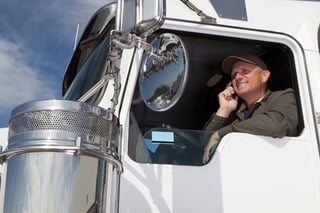The deadly results of a high-speed crash involving a large truck versus a small car can often be related to one or more drivers using a cell phone. The last thing a driver should want to be faced with in an accident is contributing causes from the use of a cell phone.
The Federal Motor Carrier Safety Administration (FMCSA) has issued a final rule that restricts the use of hand-held cell phones by any commercial driver. This rule, which took effect January 2, 2012, prohibits a driver from dialing and reaching for a cell phone. All states are required to adopt the final regulations regarding the use of cell phones. Hands-free devices are ok to use. But are hands-free devices safe? Perhaps the mechanical use of a cell phone is not the only issue we have on the road that relates to cell phones. It may be the actual conversation itself that can contribute to an in cab, non-driving distraction. The results can be a disaster for any motor carrier if the driver is distracted in any way while behind the wheel of the truck. Professional drivers should always keep focused on the road around them. Their primary obligation is to be alert and ready to react properly when hazards or situations become challenging. Cell phones are one of several non-driving functions that divert the driver's attention away from the primary goal of protecting life.
took effect January 2, 2012, prohibits a driver from dialing and reaching for a cell phone. All states are required to adopt the final regulations regarding the use of cell phones. Hands-free devices are ok to use. But are hands-free devices safe? Perhaps the mechanical use of a cell phone is not the only issue we have on the road that relates to cell phones. It may be the actual conversation itself that can contribute to an in cab, non-driving distraction. The results can be a disaster for any motor carrier if the driver is distracted in any way while behind the wheel of the truck. Professional drivers should always keep focused on the road around them. Their primary obligation is to be alert and ready to react properly when hazards or situations become challenging. Cell phones are one of several non-driving functions that divert the driver's attention away from the primary goal of protecting life.
What can a company do to limit the risks and exposures of cell phone use while driving?
Develop a cell phone policy. A cell phone policy coupled with other company safety policies can contribute to driver awareness and may eventually reduce distractions which may contribute to a critical crash.
How can the restricted use of cell phones reduce the distraction risks even with a hands-free device?
Look around at other motorists who frequently use cell phones. They will be in the left lane doing 15-20 mph over the speed limit talking away not realizing they are speeding and following too close. Why? They are totally distracted from the driving function.
How can this be when they are using a blue tooth or other hands-free device and both hands are on the wheel while they are looking straight ahead? They are deeply engaged in the conversation and are not being conscious of the primary function of driving safely. So with this said, the use of a cell phone while operating a CMV can elevate the danger and risk of being involved in a critical crash.
What is an effective cell phone policy?
A simple one line policy statement can be the prohibition of cell phone use by the CMV driver unless the vehicle is safely parked off of the road. In other words, if you are the driver and the vehicle is in motion, you cannot use the cell phone regardless of the hands-free device you may be using. If there is a co-driver, then he or she can use a cell phone as long as they are not operating the CMV.
When should carriers allow drivers to use both personal or company-provided cell phones?
While the vehicle is safely parked off of any public highway or road. This can be in a truck stop, shipper facilities, consignee locations, or a rest area where the truck can be safely parked and secured. Then the driver can use the cell phone with or without a hands-free device. As long as the CMV is not moving.
What if a motor carrier uses cell phones to initiate dispatch?
The carrier should consider changing that procedure and policy. They should create a safer method of communicating to drivers about newly acquired loads and other information. A carrier with a practice and policy in place using cell phones while drivers are behind the wheel can be more difficult to defend if there is a critical crash. Developing a cell phone policy that prohibits the us of cell phones by drivers while operating a CMV can be favorable for any carrier. Cell phone records are easy to access, so take steps now to reduce your risks and exposures to that critical crash resulting from distracted driving.
Reprinted with permission from Great West Casualty Company.
What problems in your organization can we help you solve? Contact our Risk Management Specialist today!
Larry Barton
Risk Managment Specialist | Joe Morten & Son, Inc.
O: 865.392.3777 | C: 865.771.9506

